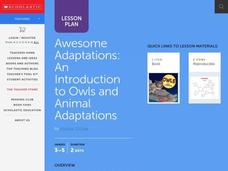Curated OER
When Is a Noun a Verb? Examining Double Duty Words
The New York Times' Learning Network provides great lessons! This one uses articles from the paper to help readers understand homonyms like mail (verb and noun). It also includes an exercise in reading informational text. Links to the...
EduGAINs
Coureurs de Bois, First Nation Peoples, and the Fur Trade
The interactions between the Coureurs de bois (runners of the woods) and the First Nation Peoples as they engaged in the fur trade are the focus on this Canadian history exercise. Kids select learning centers based on their learning...
Core Knowledge Foundation
Seasons and Weather: Supplemental Guide
From warm summer days to cold winter nights, this 10-lesson unit takes children on an exploration of seasons. Using the included reading passages and images, a series of read-aloud lessons and vocabulary activities provide young children...
Scholastic
Awesome Adaptations
Engaged learners discover how an owl beak works and how animals adapt to their environment. This task is part one of a three-part series.
Curated OER
Introduce Vocabulary: "I Can't," Said the Ant (Cameron)
With both rhyme and a fun storyline, Polly Cameron's story "I Can't," Said the Ant is a useful resource for vocabulary in context. Emerging readers focus on five key words: cooperate, mend, nimble, sling, and trickle. After a brief...
Washington Office of Superintendent of Public Instruction
Using Our Senses to Observe
Look around and explore. Little ones use their five senses with some day-to-day activities designed to guide observation and apply STEM strategies. Young scientists learn through comparing/contrasting and observing with magnifiers as...







